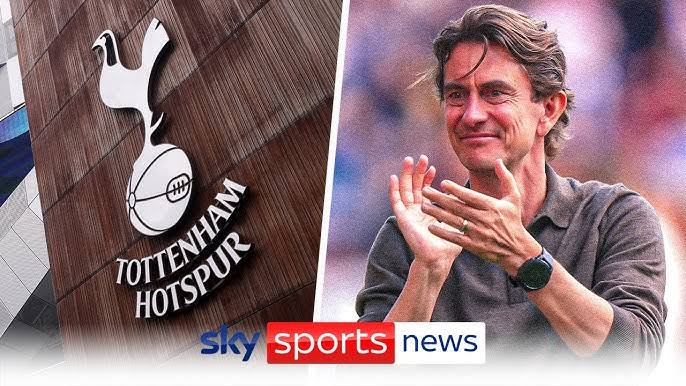Tottenham are set to appoint former Liverpool goalkeeper coach Fabian Otte onto Thomas Frank’s backroom team.

The winds of change are blowing through North London as Tottenham Hotspur undergoes one of the most significant coaching overhauls in recent memory. With Thomas Frank now at the helm, replacing Ange Postecoglou, the club is methodically assembling a backroom team that promises to bring fresh tactical insights and a new philosophical approach to the beautiful game.
The latest addition to Frank’s growing coaching dynasty is Fabian Otte, the highly-regarded goalkeeper coach who recently departed Liverpool. At just 34 years old, Otte represents the new generation of specialized coaching talent that modern football demands. His swift transition from Anfield to North London speaks volumes about both his reputation and Frank’s ambitious vision for the club.
Otte’s coaching pedigree is impressive and diverse. His experience spans multiple leagues and cultures, having worked with the USA national team, Borussia Mönchengladbach, and Burnley before his stint at Liverpool. This international perspective could prove invaluable as Tottenham seeks to compete on multiple fronts, including European competitions where tactical flexibility and cultural adaptability often determine success.
The German coach’s appointment is particularly significant when considering Tottenham’s goalkeeper situation. The club has invested heavily in shot-stoppers over recent years, and having a specialist coach with Premier League experience could unlock new levels of performance from their keepers. Otte’s work at Liverpool, where he helped maintain one of the league’s most consistent defensive units, suggests he brings both technical expertise and modern training methodologies.
Frank’s recruitment strategy reveals a coach who values loyalty and proven relationships. The arrival of Justin Cochrane, Chris Haslam, and Joe Newton from Brentford demonstrates Frank’s commitment to bringing his trusted inner circle to North London. This isn’t merely nepotism – it’s strategic continuity.
At Brentford, Frank orchestrated one of the most remarkable stories in modern football. Taking a club from League One to the Premier League and establishing them as a competitive force required more than just tactical acumen. It demanded a complete philosophical alignment throughout the coaching structure, something that Frank clearly achieved with his Brentford team.
Justin Cochrane, in particular, brings valuable experience in player development and tactical analysis. His role in Brentford’s data-driven approach to player recruitment and tactical preparation was instrumental in their success. For Tottenham, a club that has often struggled with consistency in their tactical approach, Cochrane’s analytical mindset could provide the foundation for more systematic improvement.
Chris Haslam’s expertise in fitness and conditioning represents another crucial element of Frank’s holistic approach. Modern football demands peak physical condition, and Haslam’s methods helped Brentford compete physically against clubs with far superior resources. At Tottenham, where the squad will face the demands of potentially four competitions, his expertise could be the difference between maintaining performance levels and suffering from fatigue-related drop-offs.
Joe Newton’s addition to the coaching staff brings youth development expertise that aligns perfectly with Tottenham’s long-term strategy. The club has invested heavily in their academy and training facilities, and Newton’s experience in nurturing young talent could help bridge the gap between the academy and first-team football.
Perhaps the most intriguing appointment is Andreas Georgson’s arrival from Manchester United. This move represents a significant coup for Frank and Tottenham, as Georgson was highly regarded at Old Trafford for his tactical innovation and analytical approach to the game.
Georgson’s background in sports science and tactical analysis brings a different dimension to Frank’s coaching setup. His experience at Manchester United, where he worked with some of the world’s elite players, provides valuable insight into managing high-profile personalities and expectations. This experience could prove crucial as Frank navigates the pressures of managing a club with Tottenham’s ambitious fanbase and media scrutiny.
The addition of Georgson also suggests Frank’s commitment to modern football’s increasingly analytical approach. The Swedish coach’s expertise in data analysis and performance metrics could help Tottenham make more informed tactical decisions and player development choices
As Frank’s players begin arriving at the club’s Enfield headquarters, the focus shifts to implementing the new coaching philosophy. The upcoming tour of South Korea represents more than just a commercial opportunity – it’s Frank’s first chance to work intensively with his squad and begin the process of tactical integration.
Pre-season tours often provide valuable insights into a manager’s methods and priorities. Frank’s approach to these early sessions will be closely watched for signs of his tactical preferences and man-management style. The South Korea tour also offers an opportunity to assess player fitness levels and begin the process of identifying which players fit into his long-term vision.
The timing of the tour is particularly significant as it comes during a period of potential squad changes. With transfer speculation swirling around several players, Frank must balance preparing his current squad while remaining flexible enough to integrate new signin
Tottenham’s pursuit of West Ham’s Mohamed Kudus represents more than just a transfer target – it’s a statement of intent about the club’s ambitions under Frank’s leadership. The reported £50 million initial offer, while rejected, demonstrates the club’s willingness to invest in Frank’s vision.
Kudus represents the type of versatile, technically gifted player that Frank has historically favored. His ability to play multiple positions and contribute both defensively and offensively aligns with the flexible tactical approach that made Frank successful at Brentford. The player’s reported determination to join Tottenham suggests that Frank’s reputation and the club’s project have genuine appeal to high-quality players.
The pursuit also highlights Frank’s understanding of the Premier League’s demands. Kudus has already proven his ability to perform at the highest level in England, reducing the adaptation risk that often accompanies international signings. His familiarity with London football, having played for West Ham, could facilitate a smoother transition to Tottenham’s style of play.
While Frank’s tactical approach at Brentford was characterized by flexibility and adaptability, certain patterns emerged that Tottenham fans can expect to see at their club. His preference for high-intensity pressing, quick transitions, and tactical versatility suggests a more dynamic approach than the club has employed in recent seasons.
Frank’s success at Brentford was built on maximizing player strengths while minimizing weaknesses through tactical adjustment. This approach could be particularly beneficial for Tottenham’s squad, which contains several players who have struggled for consistency under previous regimes.
The emphasis on data-driven decision-making, evidenced by his coaching appointments, suggests that Frank will take a more analytical approach to team selection and tactical preparation. This could lead to more informed substitutions, better tactical adjustments during matches, and improved player development programs.
Frank’s task at Tottenham is significantly more complex than his previous role at Brentford. The expectations are higher, the scrutiny more intense, and the pressure to deliver immediate results more pronounced. However, his coaching appointments suggest a manager who understands these challenges and is building a support structure capable of handling them.
The integration of his new coaching team will be crucial to early success. The familiarity between Frank and his Brentford colleagues should accelerate this process, but incorporating new voices like Otte and Georgson will require careful management to ensure everyone is aligned with the club’s objectives.
One of the most promising aspects of Frank’s approach is his demonstrated commitment to youth development. His track record at Brentford shows a manager willing to give young players opportunities when they deserve them, something that could benefit Tottenham’s highly-rated academy graduates.
The appointment of coaches with youth development experience suggests this will be a priority area. For a club that has invested heavily in facilities and youth infrastructure, having a coaching team committed to developing young talent could provide both sporting and financial benefits.
Frank’s coaching team will need to prepare for the possibility of European competition, something that adds another layer of complexity to their preparation. The diverse international experience within the coaching staff, from Otte’s work with the USA national team to Georgson’s analytical expertise, provides a solid foundation for European campaigns. The tactical flexibility that Frank brings could beparticularly valuable in European competitions, where the ability to adapt to different playing styles and tactical approaches often determines success.
Managing a club like Tottenham requires more than just tactical expertise – it demands an understanding of fan expectations and media dynamics. Frank’s appointment of experienced coaches who have worked at high-profile clubs suggests an awareness of these challenges. The early transfer activity, including the pursuit of Kudus, demonstrates a commitment to backing Frank’s vision with investment. This approach could help build early goodwill with supporters while providing the manager with the tools necessary for success.
Thomas Frank’s appointment at Tottenham represents more than just a change of manager – it’s the beginning of a new era characterized by tactical innovation, analytical thinking, and a commitment to long-term development. The quality of his coaching appointments suggests a manager who understands the complexity of modern football and is building a team capable of competing at the highest level.
The combination of proven Premier League experience, international perspectives, and analytical expertise creates a coaching structure that addresses many of the challenges that have historically plagued Tottenham. While success is never guaranteed in football, Frank’s approach suggests a manager who has learned from both his successes and the experiences of others.
As the new season approaches, Tottenham fans have reasons for optimism. The systematic approach to building the coaching team, combined with evident investment in player recruitment, creates a foundation for sustained success. Frank’s track record suggests he has the skills and vision necessary to unlock the potential that has long existed within the club.
The journey ahead will undoubtedly present challenges, but with a coaching team of this quality and a clear vision for the future, Tottenham appears well-positioned to compete with the Premier League’s elite once again. The Thomas Frank era has begun, and the early signs suggest it could be the catalyst for the success that the club’s loyal supporters have been patiently waiting for.















